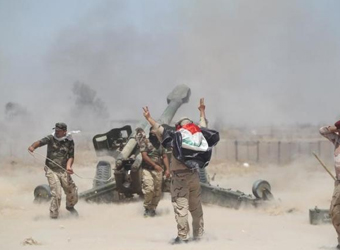Islamic State (IS) militants captured an Iraqi police colonel and eight other officers on Monday after they ran out of ammunition during a skirmish in the battle for western Mosul, an Iraqi Interior Ministry official said.
The official, who declined to be identified, said the incident took place as government forces closed in on IS fighters in the Old City and other districts, in an offensive intended to crush the hardline group in what was once the de facto capital of their self-proclaimed Islamic caliphate.
A media officer for the Interior Ministry’s Rapid Response units, Lieutenant Colonel Abdel Amir al-Mohammedawi, denied that any police officers had been captured when asked for comment.
But the Interior Ministry official told Reuters the nine men were seized in the early hours of Monday in the Bab Jadid district.
Federal police sources later said the officers had been killed and Iraqi forces were trying to recover the bodies.
Islamic State has a record of torturing and mutilating captives – civilian and military – so the incident will weigh heavily of the minds of the government troops in the street-by-street fighting for western Mosul, now in its second month.
In the capital, Baghdad, a car bomb killed at least 23 people and wounded more than 45 in a mainly Shi’ite southern district, police and medical sources said.
The blast occurred on a busy commercial street in the Amil neighborhood, the sources said.
There was no claim of responsibility, but Islamic State has carried out similar attacks in Baghdad and other cities as their hold on Mosul weakens.
Federal Police and Rapid Response units backed by helicopter gunships pressed their cautious advance on the al-Nuri Mosque in western Mosul’s Old City on Monday.
The battle for Iraq’s second city is expected to last several more weeks. The offensive was launched in October with support from U.S. artillery, air strikes and advisers, and the eastern side of the city on the Tigris river was secured in December.
The campaign for the western side is harder. The area is more densely populated, the streets are narrower and the houses closely packed together.
Attention has focused on the Old City and the al-Nuri Mosque, from where Islamic State leader Abu Bakr al-Baghdadi proclaimed the caliphate after his forces had seized swathes of territory in Iraq and Syria in 2014.
Baghdadi and other IS leaders have fled Mosul, their whereabouts unknown, but the militants still hold several other western districts beyond the Old City and are defending them with sniper and mortar fire and suicide car bombs. U.S. officials estimate that about 2,000 IS remain there.
At the same time, Islamic State forces in the Syrian city of Raqqa are under attack in a parallel conflict.
Fleeing residents said on Monday that the militants were forcing young men in western Mosul to fight for them in defense of the remaining pockets of their former stronghold, a sign that they were growing more desperate.
Ali, a former government worker, said he had hidden his sons when IS fighters came looking for recruits.
“It feels like the siege is ending. All they are doing now is defending,” he told Reuters, adding:”I hid my sons in the basement and told them if you want my sons you will have to kill me.”
Residents who had left said Iraqi, Syrian and other foreign militants remaining in the area tried to make them stay.
“A French militant beat me and threatened me to force me to stay,” said one woman who gave her name as Um Tahseen.
A Federal Police intelligence officer, Captain Alial-Kinani, said the militants wanted to fill up their ranks as they had suffered heavy casualties.
Some fighters were wearing civilian clothes under their uniforms and would switch outfits to mix in with fleeing civilians, he said.
“We arrested dozens who said that they were forced by Daesh to carry arms or take a bullet in the head if they refused,” Kinani said, using an Arabic acronym for Islamic State.
Meanwhile thousands of people took advantage of early morning rain and fog to flee IS-controlled areas and reach the safety of government lines.
The number of displaced people from both sides of Mosul since the start of the offensive has reached 355,000, Iraq’s immigration minister said.
Some 181,000 had poured out of western Mosul since the start of the operations to retake that side a month ago, Minister Jassim Mohammed said.
Source: Reuters
